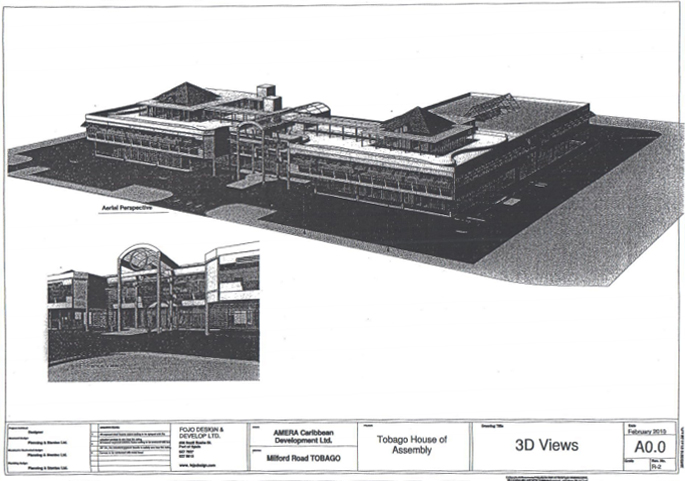
With the THA elections having become a kind of national contest, the issues of governance and integrity loom large. The two relevant controversial issues, both of which emerged late last year, were the THA/BOLT office project and the HDC’s proposed purchase of land at Calcutta No. 2 Settlement.
Both those projects have given me serious cause for concern in terms of proper public procurement practice, so much so that I see them as being two sides of the same coin. Both these cases are models of inadvisable dealings in Public Money of a type which no prudent or reputable company would undertake. I am choosing my words carefully since recent reports are that litigation has already started on both projects.
I do not at all agree with the widespread myth that corruption is a minor thing which adds maybe 10% or 15% to the cost of projects. That misinformation is nothing but public mischief which has blinded us to the scale of the theft of Public Money, so it must be completely demolished. In the case of the 1970s to 1980s ‘Government to Government Arrangements’ the then PM, George Chambers, told the nation that two out of every three ‘Petro-dollars’ was wasted or stolen. In the ongoing imbroglio over the $1.6Bn Piarco Airport project, we learned from the DPP’s S.34 statement that $1.0Bn of Public Money had been located in offshore bank accounts.
The DPP’s S.34 Statement on Wednesday September 12, 2012
“…These cases involve allegations of a conspiracy to defraud the Republic of Trinidad and Tobago of over TT$1 billion by the fraudulent use of bonds and the rigging of the contracts for the various Construction packages for the Piarco Airport Project…”
The DPP’s full statement is here.
Also, from “Cops target MP in $1Bn airport scam” in Trinidad Guardian of Friday 5 March, 2004 –
“…TV6 News reported last night that Lindquist and Interpol officers had discovered more than $1billion stashed away in off-shore accounts, arising out of corruption in the airport project…”
This article deals with the THA/BOLT project, which is a Public Private Partnership. The PPP is a procurement model now being pursued by this government, according to the strategy outlined in the 2013 budget.
Build Own Lease Transfer (BOLT) is a subset of the PPP procurement method. Under a BOLT arrangement a client has a facility built by the private sector at their expense – the client makes agreed rental payments so that the developer can cover the cost of building the project and a reasonable profit. At the end of the agreed lease period, the facility is transferred to the client.
There has been effective use of PPP to produce Public Goods like the Brian Lara Promenade. BOLT has also been used to procure prominent POS buildings such as NALIS, UTC HQ and Ministry of Works HQ (via Republic Bank) and the AG’s office at Cabildo Chambers (via NIPDEC).
The PPP can be a feasible method of procuring public goods, offices or other facilities in situations where the State is unable to commit to the capital expenditure and there is a pressing need. The strong selling-point of the PPP is that the private sector takes the risks and is allowed to make a reasonable profit while the public sector can add to its stock of capital goods without the risks of project execution.
These PPP arrangements are now being intensely criticized in developed jurisdictions as having served the public interest very poorly. The focal point of much of the criticism has been the fact that, despite the rubric, the private sector has seldom taken any genuine risk.
Turning to the actual THA/BOLT deal, I have to say that the decision to publish a large number of the important documents in relation to this arrangement is to the credit of the THA.
• The bundle of documents are here.

In response to the request from the Minister of Finance, THA leader Orville London said:
…that under the laws and the T&T Constitution the Finance Minister has no authority to instruct him to provide information to him within any timeframe.
However, London said, in the interest of public disclosure and considering that this particular transaction has generated so much discussion he believed that he had a responsibility to make the information available to the public and the Minister…
This is a bold and in my view admirable initiative by a leading Public Official and I have to say that it has tempered my scepticism over this project. I only wish that Cabinet Ministers took a similar view of their responsibilities.
The THA ‘bundle’ details the ongoing financial shortfall in allocations from Central govt, the main point of which is the fact that the THA is definitely resource-starved in relation to the arrangements with Central govt. When one considers the financial state of the THA alongside the national economic outlook – we are in our fourth year of deficit financing in relation to the national budget – it is a sobering background to this discourse.
I have spoken with all the main parties to this arrangement and this is a summary of the THA/BOLT deal. The THA purchased a 3-acre parcel of land at the corner of the Claude Noel Highway and the Shirvan Road from private landowners for $12M and immediately leased it back to them for a 199-year lease at a nominal rent. The private developers have agreed to erect an 83,000sf office building at a cost of $143M and the THA has agreed to lease it for 20 years at a fixed rent of $15.61psf – an annual rent of about $15.55M, totalling some $311M over the term of the 20-year lease – with the property reverting to the THA at the end of the lease. Those offices are to be built for the THA’s Division of Agriculture, Marine Affairs, Marketing and the Environment.
There have been recent reports of the AG’s lawsuit to test the legality of the THA/BOLT arrangement, so this is not an attempt to pre-empt the Court in ruling on those submissions.
My concerns arise at the level of the Needs Assessment, which must be the first stage of any proper procurement process, public or private. The purpose of the Needs Assessment is to determine the rationale for and scope of the project so that preliminary consideration can be given to the key elements before any high costs are incurred. In this case, we are told that the developer approached the THA, which is unusual to the extent that best practice requires that extra care be taken with unsolicited proposals.
The main points concerning me are that once again we are seeing large-scale expenditure of Public Money without a proper business case having been made. The opinion of Hamel-Smith & Co as to the legality of the transaction is of no comfort to me, this is a matter of making a sound investment decision. A legal opinion is necessary but not sufficient.

That 6-page legal opinion,dated 3 January 2011,by Timothy Hamel-Smith (who was appointed Senate President on 18 June 2010) is at page 168 of the ‘bundle’.
- Quantity of space – at pages 68 and 69 of the THA ‘bundle’ there is a ‘Note for Executive Council’ which summarises that the offices occupied by that Division – a total of 22,500sf is detailed, while a further 6,000sf can be reasonably surmised for the last Department. The average rent being paid by the THA for this Division is $8.17psf, also please note that a total of 28,500sf is now occupied by the Division for which the THA is procuring an 83,000sf office building.
- Quality of space – The cost of $143M for that space equates to $1,723 per square foot and I am reliably informed that the contract calls for a fully fitted and finished office building. That figure is at the absolute upper end of the range of costs for office buildings.
- Rent levels – According to the THA’s adviser on this project, Peter Forde, at the THA Press Conference on 10 September 2012 – see
…the monthly payment of $15.61 per square foot per month was not an unreasonable rate because there were properties in Scarborough where tenants were paying as much as $10.00 per square foot. He stressed that even if there was inflation the rate will remain the same…
The first issue I have with that is the attempt to use the $10psf comparable to justify the $15.61psf rent. That is an unreasonable ‘stretch’ by my standards as a professional valuer. Did the THA seek the opinion of the Commissioner of Valuations? Secondly, the fact that the rent cannot be increased in the event of inflation is a distraction, since the likely effect of this new, huge THA office building is that the rental market in Tobago will become saturated with the offices they vacate. The result of that is the decline in office rental values, so in the absence of any provisions for rent adjustments, the burning question has to be ‘What real risk is this developer taking?’. Risk Allocation remains a real issue.
So, in summary, we have a semi-autonomous Public Authority contracting, at a time of tremendous financial strain, to build first-class facilities three times larger than the second-class ones it currently occupies. Finally, please note that according to the ‘Note’ I cited earlier, the current monthly rent bill of the THA Division is $231,788, while the new monthly rent under this arrangement will be $1.295M – over five times more.
At the start of this article, I gave examples of the ratio at which Public Money was wasted or stolen, so just compare this project to those figures.
My next article will delve into the Calcutta Settlement land deal and its own peculiarities.
Afra, this was a very interesting and engaging read. I’m actually impatient for the part 2. So a couple layman/woman/person questions: 1. If what you have outlined is correct then it appears to me that the THA is making an unwise investment, certainly an expensive one, and the client from whom they have purchased the land and will be leasing the building from is the real winner here. Why would the THA enter into an agreement to benefit that client over the electorate?
2. Let us for the sake of argument say that the THA is making a wise investment here, is there some down-the-road benefit that we are not seeing? Is there some overall saving or benefit here?
I ask because if there isn’t some long term benefit then it’s state funding being wasted all over again with this Milshirv project and given all the other instances that have our minds reeling this may get lost in the rush.
Thank you for taking time-out to respond, Rhoda…
Just to be clear, both the deals I am critiquing in this two-parter are severely detrimental to the public interest due to the large-scale and inadvisable use of Public Money.
But there is an important part of the discourse we often overlook (ignore?) which is the fact that the private sector is also a participant in these PPP deals. As I pointed out in the part 1 article, the BOLT method and the proper procurement practices have common foundations irrespective of whether the client is a public sector or private sector entity. By way of example, I cite my Business Guardian article – published on 7th August 2008 at http://legacy.guardian.co.tt/archives/2008-08-09/bussguardian10.html – on RBTT’s new HQ. That was a major office building procured via BOLT which involved only private sector players, yet there was also the familiar pattern of inadvisable large-scale investment with a resounding silence to my legitimate queries.
The point emerging from the learning here is that without proper safeguards and procedures to eliminate absurd investment proposals, the monies entrusted to these major entities is at risk of being targeted by ‘Economic Hit-Men‘…it doesn’t matter if is THA, RBTT or even the Patrick Manning-led Cabinet (remember he told us on 13th May 2008 that every UDECOTT project was approved by Cabinet)…
Next week is the next side of the same coin…
Regards
Afra
So, you’re saying that the measures and safeguards don’t exist? So THA or RBT don’t have guidelines to follow in arrangements such as these? Or is it that they ignore the procurement procedures and there is no body to make them do what is enshrined in law?
The mere fact that the THA leader could place such reliance on the Hamel-Smith opinion – with which I have substantive difficulty, but that is another column in itself – and the PP government did not call him on it, is a sign of how far off-course we are. I am setting-aside that Hamel-Smith is a major player in the PP, that is simply immaterial. We seem content to rely on form and ignore the substantive issues…
Just imagine your parents leave a $5M property for you and your siblings…you are managing the property because your siblings trust you…you sell it to me for $3M – because we good like that! LOL! – and when asked to explain by your siblings, you telling them how the deed is prepared by such and such lawyer and was registered on such and such date…if the substance of transaction is unsound it should not proceed, even if attorneys find some way to make it all fit within the existing laws! To do a bad deal like that to your siblings is a substantial breach of your position of trust.
By way of comparison, in the related profession of Accounting/Auditing, the ‘rule-of-thumb‘ is to allow the substance of a transaction/arrangement to prevail over its form in exercising one’s judgment properly.
Making that shift in the mind of the public – the shift from asking if something is literally illegal to the place where the standard is the proper exercise of one’s judgment as a responsible person in a position of trust – is at the core of our Public Procurement work and all my own non-JCC campaigning…you see?
Afra
Afra, I see the issue as being hegemonic. We do not vote for the best minds to hold public offices so that commerce manipulates them as easily as the African chiefs were ‘bargained’ with to supply Africans to be enslaved. Many of our decision-makers are unequipped to ‘do-right’ because the options placed before them to select from have been grafted from amorphous sources so entangled in corruption and greed that either way the private sector wins. They are there for the long haul whereas many politicians have ‘five-year’ life spans and they yearn to construct visible ‘legacies’ of their reign like Ozymandias. It is no surprise that after 50 years of ‘self-rule’ no legislation for real transparency exists or if it does, enforcement is lacking. I refer to the closed sessions of cabinet meetings, the disbursement of public funds with no justification or receipts and no consequences for abuse. I have always felt that there should be surrogate parliament at the UWI where each sitting is video-twinned to selected disciplines that could endorse, verify, validate and record every aspect of administrative decision-making. The public is inadequately informed and have few avenues for filing challenges that can direct policies which affect them. The ombudsman is either under-worked or dis-empowered. Schools should investigate public and private sector activities so that graduates will know how viable their career choices will be and I believe too that secondary school graduates should be employed-all of them. The various private and public sector establishments should project growth-estimates and lists of vacancies should be published so that on entering form one students will know that by being successful in certain disciplines these jobs will pay them X dollars monthly and that those who do not qualify themselves will be required to do manual, military or some other identified vocation for a fixed income. These and other recommendations that can be sourced from those actively engaged in the processes of education, health, finance and jurisprudence among others. Academics are trained to become consumers so that the hegemony of corrupt commerce will thrive. We are so steeped in greed that it will take draconian measures to reverse the current trends that are backed by international vipers whose wealth and strength are formidable constructs. We simply have to re-construct the way we grow. We need Thomas Sankara.
C. McMaster
Drink only Deco Rum and coconut water or cane juice for Carnival 2013 The Venus Project is the answer
Date: Wed, 23 Jan 2013 19:43:15 +0000 To: mc.masterchris@hotmail.com
Chris,
I have the opposite view in this instance…our politicians are just too bright! That is the sad fact and a living lesson on the painful consequences of a wasted mind…in the case of our successive Cabinets, many, many wasted minds…as I have repeatedly said, the T&T alphabet is A for Apple, B for Bat and C for their self…that is how the thing is running here now…
Very telling also is the amount of time spent on the internet in sheer escapism, even when we are supposedly communicating or debating…so many racist, trivial or just plain dotish remarks that it is indicative of denial, defined as a coping mechanism for matters which are at one and the same time insescapable and painful…the reading on that word is fascinating.
I am going to continue my work by analysing these various schemes so that people who are interested can become more aware…
Thanks for your support, Chris and I hope that you share my work with your students.
Afra